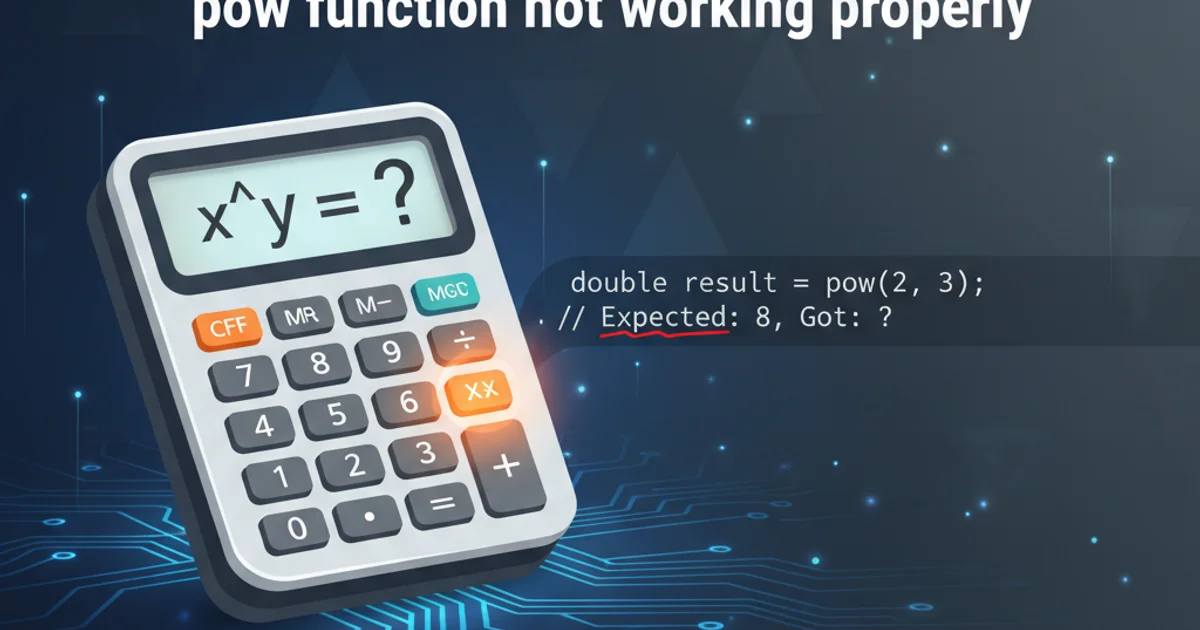pow function not working properly
Categories:
Demystifying pow() in C++: Common Pitfalls and Solutions

Explore why the pow() function in C++ might not behave as expected, covering integer truncation, floating-point precision, and alternative approaches for robust power calculations.
The pow() function, part of the <cmath> library in C++, is designed to calculate the power of a number (base raised to an exponent). While seemingly straightforward, developers often encounter unexpected results when using it, especially with integer types or due to floating-point inaccuracies. This article delves into the common reasons behind pow() not working as anticipated and provides practical solutions and best practices for accurate power calculations in C++.
Understanding pow() Signatures and Return Types
The pow() function in C++ is overloaded to handle various numeric types, but its most common forms operate on double or long double and return a double or long double. This is a crucial detail often overlooked, leading to implicit type conversions and potential data loss when the result is assigned back to an integer type.
#include <iostream>
#include <cmath>
int main() {
int base = 2;
int exponent = 3;
int result_int = pow(base, exponent); // Implicit conversion from double to int
double result_double = pow(base, exponent);
std::cout << "pow(2, 3) as int: " << result_int << std::endl; // Might be 7 or 8
std::cout << "pow(2, 3) as double: " << result_double << std::endl; // 8.0
double fractional_base = 2.5;
int fractional_exponent = 2;
int result_fractional_int = pow(fractional_base, fractional_exponent); // 6.25 truncated to 6
std::cout << "pow(2.5, 2) as int: " << result_fractional_int << std::endl; // 6
return 0;
}
Demonstration of pow() with integer and double assignments.
flowchart TD
A[Call pow(base, exponent)] --> B{Input Types?}
B -->|int, int| C[Implicitly convert to double]
B -->|double, double| D[Use double precision]
C --> E[Calculate power as double]
D --> E
E --> F{Return Value Type?}
F -->|Assign to int| G[Truncate fractional part]
F -->|Assign to double| H[Store full double value]
G --> I[Potential unexpected integer result]
H --> J[Accurate floating-point result]
I & J --> K[End]Flowchart illustrating pow() behavior with different type assignments.
Common Pitfalls and Their Solutions
The primary issues with pow() stem from its floating-point nature. Here's a breakdown of common problems and how to address them:
pow() for exact integer results, especially when the base or exponent are integers. Floating-point arithmetic is inherently approximate.1. Integer Truncation
When pow() returns a double (e.g., 7.999999999999999 for pow(2, 3)) and this value is assigned to an int, the fractional part is truncated. This can lead to 7 instead of the expected 8.
#include <iostream>
#include <cmath>
int main() {
// Problem: Truncation for what should be an exact integer result
int result_truncated = pow(2, 3); // Might be 7 due to precision issues and truncation
std::cout << "pow(2, 3) (truncated): " << result_truncated << std::endl;
// Solution 1: Round the result before casting to int
int result_rounded = static_cast<int>(round(pow(2, 3)));
std::cout << "pow(2, 3) (rounded): " << result_rounded << std::endl;
// Solution 2: Implement integer power function for exact results
long long int_pow(int base, int exp) {
long long res = 1;
for (int i = 0; i < exp; ++i) {
res *= base;
}
return res;
}
int result_int_func = int_pow(2, 3);
std::cout << "int_pow(2, 3): " << result_int_func << std::endl;
return 0;
}
Addressing integer truncation with rounding and a custom integer power function.
2. Floating-Point Precision Issues
Floating-point numbers cannot perfectly represent all real numbers. This can lead to tiny inaccuracies that accumulate, making comparisons with == unreliable and causing unexpected behavior even when not truncating to an integer.
#include <iostream>
#include <cmath>
#include <iomanip>
int main() {
double base = 0.1;
double exponent = 2.0;
double result = pow(base, exponent);
std::cout << std::fixed << std::setprecision(20);
std::cout << "pow(0.1, 2.0): " << result << std::endl; // Might be 0.010000000000000000208
std::cout << "Expected: " << 0.01 << std::endl;
if (result == 0.01) {
std::cout << "Result is exactly 0.01" << std::endl;
} else {
std::cout << "Result is NOT exactly 0.01" << std::endl;
}
// Solution: Compare floating-point numbers with an epsilon
const double EPSILON = 1e-9; // A small tolerance value
if (std::abs(result - 0.01) < EPSILON) {
std::cout << "Result is approximately 0.01" << std::endl;
} else {
std::cout << "Result is NOT approximately 0.01" << std::endl;
}
return 0;
}
Demonstrating floating-point precision issues and comparison with an epsilon.
==). std::abs(a - b) < EPSILON is the standard approach.Alternatives for Integer Powers
For calculating integer powers (where both base and exponent are integers), a custom loop or bit manipulation can provide exact results without floating-point overhead or precision issues.
#include <iostream>
// Iterative approach for integer power
long long integer_power_iterative(int base, int exp) {
long long res = 1;
if (exp < 0) {
// Handle negative exponents if needed, e.g., return 0 or throw error
return 0; // Or handle as 1/base^|exp|
}
for (int i = 0; i < exp; ++i) {
res *= base;
}
return res;
}
// Recursive approach for integer power (more elegant, but can be slower for large exp)
long long integer_power_recursive(int base, int exp) {
if (exp == 0) return 1;
if (exp == 1) return base;
if (exp % 2 == 0) {
long long half_pow = integer_power_recursive(base, exp / 2);
return half_pow * half_pow;
} else {
return base * integer_power_recursive(base, exp - 1);
}
}
int main() {
std::cout << "Iterative (2, 10): " << integer_power_iterative(2, 10) << std::endl; // 1024
std::cout << "Recursive (3, 4): " << integer_power_recursive(3, 4) << std::endl; // 81
return 0;
}
Custom integer power functions using iterative and recursive methods.